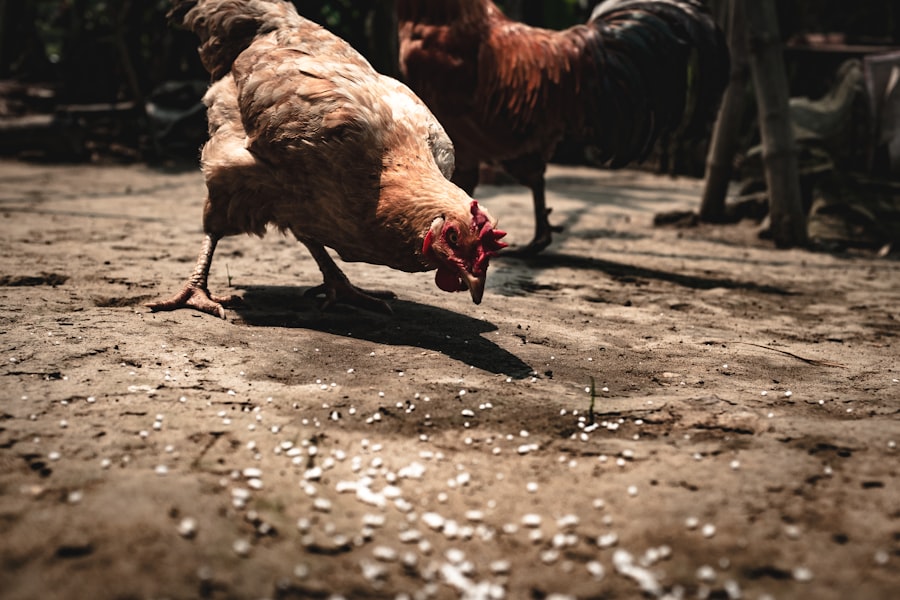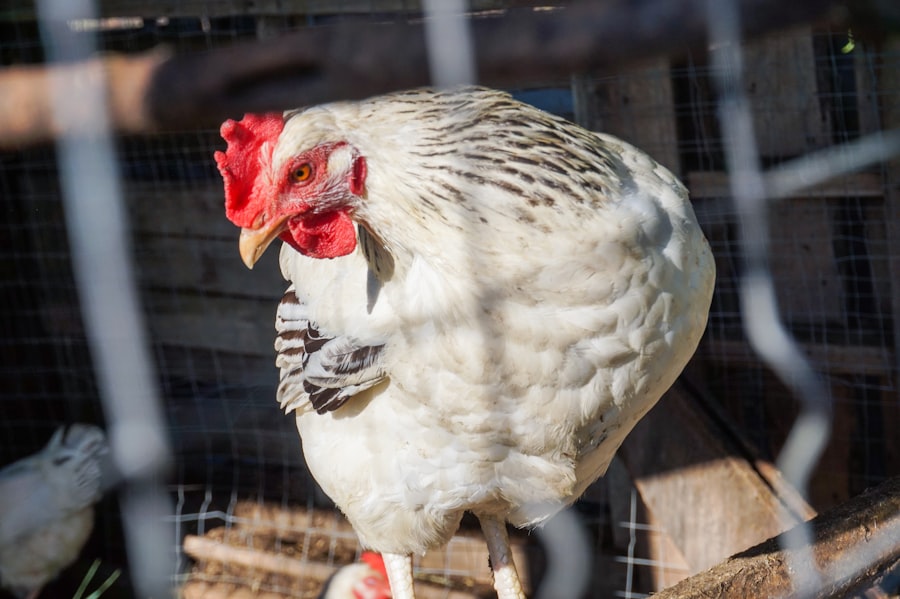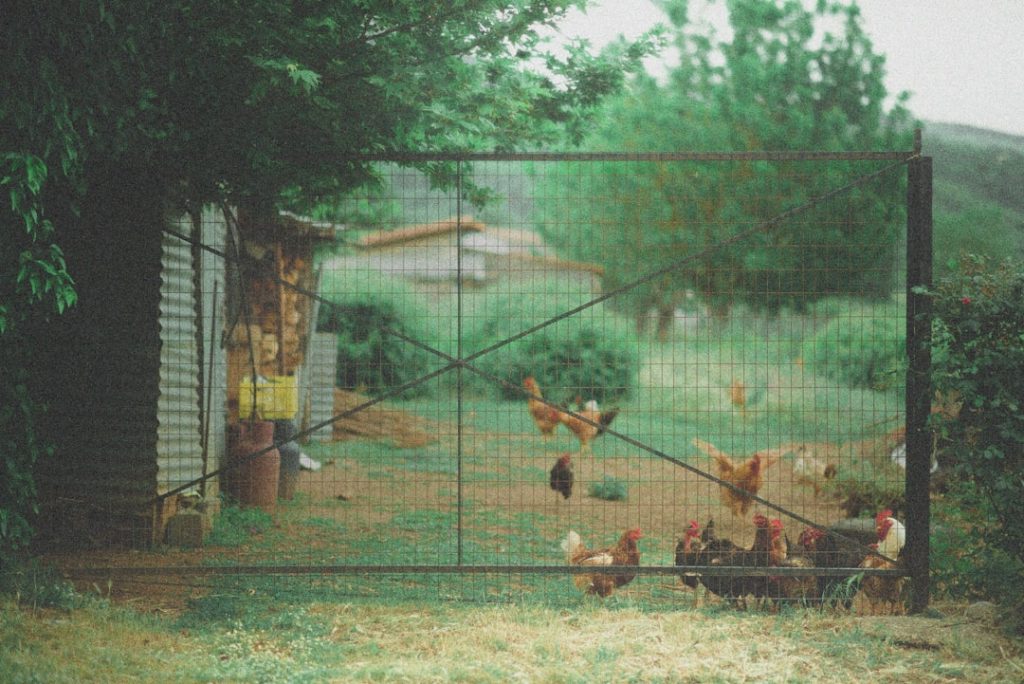When selecting chicken breeds for a backyard flock, several factors should be considered. Climate is a crucial element, as some breeds are better adapted to cold weather, while others thrive in warmer conditions. The purpose of the flock is also important, whether it’s for egg production, meat production, or companionship.
Breeds like Leghorns and Rhode Island Reds are known for high egg production, while Cornish Cross and Freedom Rangers are suitable for meat production. Temperament is another significant factor, as breeds vary in their docility and friendliness. Some chickens are more skittish or aggressive, so it’s essential to choose a breed that aligns with personal preferences and lifestyle.
Space availability is a critical consideration. For small backyards, compact breeds adaptable to confinement, such as Bantams like Silkies or Sebrights, are suitable. These breeds are popular among urban chicken keepers due to their small size and friendly nature.
Larger properties can accommodate bigger breeds like Orpingtons or Australorps, which are known for their foraging abilities and thrive in free-range environments. Thorough research on different breeds and careful consideration of specific needs and circumstances are essential for making an informed decision when choosing chicken breeds for a backyard flock.
Table of Contents
- 1 Housing and Coop Design
- 2 Feeding and Nutrition
- 3 Health and Veterinary Care
- 4 Daily Care and Maintenance
- 5 Egg Production and Collection
- 6 Legal and Environmental Considerations
- 7 FAQs
- 7.1 What are the basic requirements for keeping chickens in the UK?
- 7.2 What type of housing do chickens need in the UK?
- 7.3 What should I feed my chickens in the UK?
- 7.4 What are the legal requirements for keeping chickens in the UK?
- 7.5 How do I keep my chickens healthy in the UK?
- 7.6 What are the common predators of chickens in the UK?
Key Takeaways
- When choosing a breed, consider factors such as egg production, temperament, and climate adaptability
- Housing and coop design should prioritize safety, ventilation, and space for nesting and roosting
- Feeding and nutrition should include a balanced diet of commercial feed, fresh water, and occasional treats
- Regular health check-ups and vaccinations are essential for maintaining a healthy flock
- Daily care and maintenance involve cleaning the coop, collecting eggs, and monitoring for any signs of illness or distress
- Egg production can be maximized through proper nutrition, lighting, and stress management
- Legal and environmental considerations may include zoning laws, waste management, and predator control
Housing and Coop Design
Ventilation and Insulation
When designing your chicken coop, it’s essential to consider factors such as ventilation, insulation, and predator-proofing. Adequate ventilation is crucial for maintaining good air quality and preventing moisture buildup, which can lead to respiratory issues in chickens. This can be achieved through windows, vents, and proper coop placement. Additionally, insulation is important for regulating temperature and keeping your chickens comfortable in both hot and cold weather. Insulating the walls and roof of the coop can help maintain a consistent temperature year-round.
Predator-Proofing and Security
Predator-proofing is another essential aspect of coop design. This includes using sturdy materials for construction, such as hardware cloth or welded wire, to prevent predators from gaining access to your flock. Additionally, it’s important to consider factors such as latches and locks on doors and windows, as well as burying wire mesh around the perimeter of the coop to deter digging predators.
Space Requirements and Nesting Boxes
In terms of space requirements, it’s recommended to provide at least 2-3 square feet of coop space per chicken, as well as outdoor space for them to roam and forage. Nesting boxes should also be included in the coop design to provide a comfortable and private space for your hens to lay eggs.
A Well-Designed Coop for a Healthy Flock
Ultimately, a well-designed coop is essential for the health and well-being of your flock. By considering these key factors, you can create a safe and comfortable environment for your chickens to thrive.
Feeding and Nutrition

Proper feeding and nutrition are essential for maintaining a healthy and productive backyard flock. When it comes to feeding chickens, it’s important to provide a balanced diet that meets their nutritional needs at each stage of life. A good quality commercial feed formulated specifically for chickens is a great foundation for their diet.
This feed typically contains a balanced mix of protein, carbohydrates, vitamins, and minerals essential for overall health and egg production. Additionally, it’s important to provide access to fresh water at all times, as dehydration can quickly lead to health issues in chickens. In addition to commercial feed, chickens can also benefit from supplemental treats and foraging opportunities.
Treats such as fruits, vegetables, mealworms, and scratch grains can be given in moderation as a source of enrichment and additional nutrients. It’s important to avoid overfeeding treats, as this can lead to nutritional imbalances and obesity in chickens. Foraging opportunities, such as access to grassy areas or a chicken-friendly garden, can also provide additional nutrition and mental stimulation for your flock.
It’s also important to consider the specific nutritional needs of different breeds and life stages when feeding your flock. For example, laying hens require a higher level of calcium in their diet to support eggshell production, while chicks require a higher level of protein for growth and development. Additionally, certain breeds may have specific dietary requirements based on their size or activity level.
Ultimately, providing a balanced diet that meets the specific needs of your flock is essential for their overall health and productivity.
Health and Veterinary Care
Maintaining the health of your backyard flock is essential for their well-being and productivity. Regular health checks and preventative care can help identify and address potential issues before they become serious problems. When it comes to health care for chickens, it’s important to establish a relationship with a poultry-friendly veterinarian who can provide guidance on preventative care, as well as diagnose and treat any health issues that may arise.
One important aspect of preventative care is maintaining a clean and sanitary living environment for your flock. This includes regularly cleaning the coop, providing fresh bedding, and ensuring good ventilation to prevent respiratory issues. Additionally, practicing good biosecurity measures can help prevent the spread of diseases within your flock.
This includes quarantining new birds before introducing them to your existing flock, as well as limiting exposure to wild birds and other potential sources of disease. In terms of specific health concerns, there are several common issues that backyard chicken keepers should be aware of. These include parasites such as mites and worms, respiratory issues such as infectious bronchitis or mycoplasma gallisepticum, and reproductive issues such as egg binding or prolapse.
It’s important to be familiar with the signs of illness in chickens so that you can quickly identify and address any potential health issues. Additionally, providing a balanced diet, access to clean water, and opportunities for exercise can help support overall health and immunity in your flock.
Daily Care and Maintenance
Daily care and maintenance are essential aspects of keeping a healthy and productive backyard flock. This includes tasks such as feeding and watering your chickens, collecting eggs, cleaning the coop, and monitoring the health and behavior of your flock. Providing fresh water at all times is crucial for preventing dehydration in chickens, especially during hot weather.
Additionally, ensuring that your chickens have access to a balanced diet through commercial feed and supplemental treats is essential for their overall health and productivity. Collecting eggs daily is an important task that not only ensures that eggs are gathered promptly but also allows you to monitor the reproductive health of your hens. It’s important to check for any abnormalities in egg production or quality, as this can be an indicator of potential health issues in your flock.
Cleaning the coop regularly is also essential for maintaining good hygiene and preventing the buildup of bacteria or parasites. This includes removing soiled bedding, replacing nesting material, and disinfecting surfaces as needed. In addition to daily care tasks, it’s important to spend time observing and interacting with your flock on a regular basis.
This allows you to monitor their behavior and health closely, as well as provide enrichment through activities such as dust bathing areas or hanging treats for them to peck at. Ultimately, daily care and maintenance are essential for keeping your backyard flock healthy, happy, and productive.
Egg Production and Collection

Nutrition and Hydration
To support egg production and shell quality, laying hens need a diet rich in protein and calcium. Additionally, providing access to fresh water at all times is vital for maintaining good hydration levels in your hens.
Comfortable and Stress-Free Environment
A comfortable nesting area with clean bedding is essential for encouraging regular egg laying in your flock. Nesting boxes should be located in a quiet and private area of the coop to provide hens with a sense of security while they lay their eggs.
Egg Collection and Storage
Collecting eggs daily is crucial to prevent damage or pest attraction. When collecting eggs, handle them carefully to prevent breakage or contamination. Eggs should be gathered frequently throughout the day to ensure prompt collection after laying. Clean dirty eggs before storage using a gentle abrasive sponge or brush if necessary. Proper storage of eggs is also vital for maintaining their quality and freshness. Eggs should be stored in a cool place with consistent temperature and humidity levels to prevent spoilage.
Legal and Environmental Considerations
Before starting a backyard flock, it’s important to be aware of any legal restrictions or regulations in your area regarding chicken keeping. Some municipalities have specific zoning laws or ordinances that dictate whether or not you can keep chickens on your property, as well as any restrictions on flock size or coop placement. It’s important to research these regulations thoroughly before starting your flock to ensure that you are in compliance with local laws.
In addition to legal considerations, it’s also important to think about the environmental impact of keeping backyard chickens. Proper waste management is essential for preventing pollution and maintaining good hygiene in your community. This includes proper disposal of chicken waste through composting or other environmentally friendly methods.
Additionally, managing noise levels from crowing roosters or clucking hens is important for maintaining good relationships with neighbors. Finally, it’s important to consider the impact of chicken keeping on local wildlife and ecosystems. Providing secure coops and runs can help prevent conflicts with predators such as raccoons or foxes while also protecting native bird populations from potential diseases carried by domestic chickens.
Ultimately, being mindful of legal regulations and environmental considerations is essential for responsible chicken keeping in a backyard setting. In conclusion, keeping a backyard flock can be a rewarding experience that provides fresh eggs, natural pest control, and an opportunity to connect with nature. However, it’s important to carefully consider factors such as breed selection, housing design, feeding and nutrition, health care, daily care tasks, egg production, legal considerations, and environmental impact before starting your own flock.
By taking these factors into account and providing proper care for your chickens, you can create a healthy and productive environment for your feathered friends while enjoying the many benefits of backyard chicken keeping.
If you’re looking for more tips on keeping chickens in the UK, be sure to check out Poultry Wizard’s article on how to insulate a chicken coop. This helpful guide provides valuable information on keeping your chickens warm and comfortable during the colder months. You can find the article here.
FAQs
What are the basic requirements for keeping chickens in the UK?
In the UK, basic requirements for keeping chickens include a suitable coop or housing, access to a secure outdoor area, appropriate feed and water, and regular health checks.
What type of housing do chickens need in the UK?
Chickens in the UK require a secure and well-ventilated coop or housing that provides protection from predators and the elements. The coop should also have nesting boxes for egg-laying and perches for roosting.
What should I feed my chickens in the UK?
Chickens in the UK should be fed a balanced diet of commercial poultry feed, supplemented with kitchen scraps, grains, and greens. Access to clean water is also essential for their health and well-being.
What are the legal requirements for keeping chickens in the UK?
In the UK, there are legal requirements for keeping chickens related to their welfare, housing, and biosecurity. It is important to familiarize yourself with these regulations before keeping chickens.
How do I keep my chickens healthy in the UK?
To keep chickens healthy in the UK, it is important to provide them with a clean and safe environment, regular access to fresh water and feed, and to monitor their health for signs of illness. Regular veterinary check-ups are also recommended.
What are the common predators of chickens in the UK?
Common predators of chickens in the UK include foxes, birds of prey, and domestic pets such as cats and dogs. It is important to take measures to protect chickens from these predators, such as using secure fencing and housing.
Meet Walter, the feathered-friend fanatic of Florida! Nestled in the sunshine state, Walter struts through life with his feathered companions, clucking his way to happiness. With a coop that’s fancier than a five-star hotel, he’s the Don Juan of the chicken world. When he’s not teaching his hens to do the cha-cha, you’ll find him in a heated debate with his prized rooster, Sir Clucks-a-Lot. Walter’s poultry passion is no yolk; he’s the sunny-side-up guy you never knew you needed in your flock of friends!







